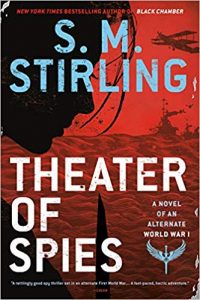Liz Bourke Reviews Theater of Spies by S.M. Stirling
 Theater of Spies, S.M. Stirling (Ace 978-0-399-58625-5, $16.00, 464pp, tp) May 2019.
Theater of Spies, S.M. Stirling (Ace 978-0-399-58625-5, $16.00, 464pp, tp) May 2019.
Since the 1980s, S.M. Stirling has been writing novels that revel in the minutiae of technological development, generally with a militaristic bent and frequently with an alternate-history (or alternate-present) setting. This attention to technological minutiae accompanies an interest in cultures and societies, and the ways in which those cultures approach military conflict. Theater of Spies, a sequel to last year’s Black Chamber, continues this vein.
Set in an alternate history of WWI where Theodore Roosevelt is the American president and the USA is well on its way to achieving a complete military and political dominance of the entire North American continent, Theater of Spies follows Black Chamber secret agent Luz O’Malley Aróstegui and her lover, technical genius and recent Black Chamber recruit Ciara Whelan, in the wake of their success averting a massive German chemical attack on the USA. Luz and Ciara’s recuperation at Luz’s family home in California is cut short, however, by rumours of a new technological development in Germany that could give the German navy an overwhelming advantage at sea. Luz and Ciara – because they’re a demonstrably effective team, and because Ciara is a genius with technology and can likely figure out exactly what this new development is – are sent undercover to Germany via South America and North Africa, a dangerous journey all the way to Berlin itself. There, they have to find a way inside the factory manufacturing the new German equipment and get their hands on its specifications before making their escape.
The assignment is perilous, but added to its danger is Horst von Dückler, a German intelligence agent and military officer who’s as ruthless as Luz and almost as effective. He has cause to want revenge on both Luz and Ciara: the last time they went up against each other, Luz thoroughly fooled him and Luz and Ciara between them caused the failure of his mission and left him some scars to remember them by. When he learns that women matching their description (whose visa documents don’t check out all the way back) have entered the country, he recruits a company of frontline soldiers armed with semi-automatic weapons to aid him in apprehending them, once he tracks them down.
Luz and Ciara aren’t just hazarding their lives, they’re risking their future with each other. Luz, at least, finds this sharpens her reactions, but their peril only increases the closer they get to their goal.
There’s a lot to like about Theater of Spies. Stirling knows how to write thrillers, and Luz is a fascinating and compelling viewpoint character. Ciara, too, is a compelling protagonist, and it’s always good to see a woman in the role of “genius engineer,” which too often has a default male picture attached. The relationship between them is nuanced and interesting, but takes a backseat to their mission and the ongoing thriller plot. In Berlin, Luz makes connections with other women, both good German housewives and transported Frenchwomen who’re being used as factory slave labour. These connections – and the ability she and Ciara have to both exploit these connections and men’s reluctance to see women as threatening in general – proves vital to their ultimate success. I do enjoy a good piece of solidarity.
There are also elements I found annoying or disturbing about Theater of Spies, mind you. Horst isn’t a particularly compelling viewpoint character – at least, not to me – and though we spend a relatively small proportion of the text with him, I would have preferred even less time in his company.
Luz and Ciara did not succeed in averting a massive German chemical attack on both England and France, so Theater of Spies has something I find perpetually annoying (and disturbing) in fiction by American authors: a state of affairs where the USA is the only significant economic, military, and political power standing against a ruthless enemy. On one hand, Stirling is pretty clear about positioning the USA as just as ruthless as its enemies. On the other hand, the scarcely questioned fundamental assumptions of nationalism – and the arrogance of nationalism and nationalist imperialism – on display here, coupled with mentions of Theodore Roosevelt’s Bureau of Eugenics, make Theater of Spies a deeply uncomfortable read.
Perhaps it’s an unavoidable side-effect of being the child and resident of a small post-colonial nation with a history of population displacement and language loss on account of the decisions of a more populous and militarily powerful neighbour, but seeing atrocity and population displacement written off as the unavoidable consequence of realpolitik, with no ethics other than the right of might is never something I find easy to pass over, either in narrative or in real life.
On the whole, though, I enjoyed reading Theater of Spies. Its positive aspects outweigh its negatives, and I really appreciate watching Luz and Ciara outwit – and outshoot, or otherwise out-murder – their opponents. If Stirling follows it up with a third volume, I’ll come along for the trip.
Liz Bourke is a cranky queer person who reads books. She holds a Ph.D in Classics from Trinity College, Dublin. Her first book, Sleeping With Monsters, a collection of reviews and criticism, is out now from Aqueduct Press. Find her at her blog, her Patreon, or Twitter. She supports the work of the Irish Refugee Council and the Abortion Rights Campaign.
This review and more like it in the May 2019 issue of Locus.
 While you are here, please take a moment to support Locus with a one-time or recurring donation. We rely on reader donations to keep the magazine and site going, and would like to keep the site paywall free, but WE NEED YOUR FINANCIAL SUPPORT to continue quality coverage of the science fiction and fantasy field.
While you are here, please take a moment to support Locus with a one-time or recurring donation. We rely on reader donations to keep the magazine and site going, and would like to keep the site paywall free, but WE NEED YOUR FINANCIAL SUPPORT to continue quality coverage of the science fiction and fantasy field.






